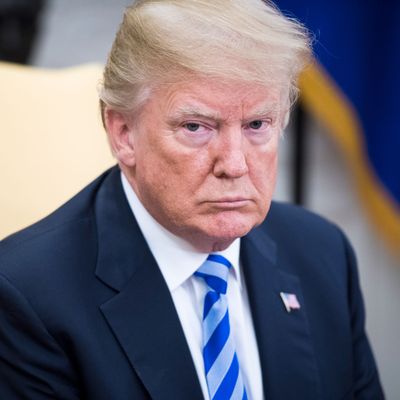
Yesterday, the National Football League capitulated to President Trump and announced a policy banning players from kneeling during the national anthem to protest police brutality. Visibly pleased that one of the most visible symbols of American culture acceded to his demands, Trump pressed his advantage. “You have to stand proudly for the national anthem or you shouldn’t be playing,” he told Brian Kilmeade. “You shouldn’t be there. Maybe you shouldn’t be in the country.”
I happen to find a lot to admire in patriotism. At its best, it can summon our highest ideals and demand that we live up to them — think Martin Luther King reciting the Declaration of Independence — and help an often-divided people see our commonality. At its worst, patriotism can devolve into my-country-right-or-wrong nationalism that allows us to overlook our failings. What is so remarkable about Trump is that even this second, lower version of patriotism is a bar he fails to clear.
When presented with evidence of brutality by foreign dictators — at least ones he hasn’t found some momentary self-interest in confronting — Trump either praises their toughness or turns the question around on America. Isn’t Vladimir Putin a killer?, he was asked last year. “There are a lot of killers,” he replied. “You think our country’s so innocent?” Queried about a crackdown by Turkish strongman Recep Tayyip Erdogan, Trump said, “When the world looks at how bad the United States is, and then we go and talk about civil liberties, I don’t think we’re a very good messenger.” No American president has openly spat on his country’s ideals in the way Trump does so casually.
Nor has any president so easily subsumed his own country’s well-being to foreign interests. Contrary to Republicans like Marco Rubio who urged their party not to reward Russian hackers, Trump publicly encouraged and exploited the criminal Russian theft of his opponent’s communications. He surrounded himself with grifters selling access — and, hence, the chance to alter American policy — to foreign governments. Just last week, Trump offered concessions to a Chinese firm that had been found guilty of stealing American technology and violating U.S. sanctions against Iran and North Korea, after China announced an investment that would benefit Trump personally. Trump has violated the values of patriotism by even its crudest definition.
The explanation for this contradiction between his demands that players revere the flag and his own contempt for its spirit is easily explained. Patriotism is the cover for Trump’s true intention, which is to delegitimize protest on behalf of African-American civil rights. One of the better specimens of the genre of reported stories from Trump country is a missive written by Michael Kruse last November about Johnstown, Pennsylvania. Kruse found that Trump’s supporters brought up the NFL protests over and over. “More than anything, what seemed to upset the people I spoke with was the National Football League players who have knelt during the national anthem to protest police brutality and racial inequality.” And when he explored the source of that anger, the emotions veered not to patriotism but to race. “All my ancestors, Italian, 100 percent Italian, the Irish, Germans, Polish, whatever — they all came over here, settled in places like this, they worked hard and they earned the respect,” one voter told him. “They earned the success that they got. Some people don’t want to do that. They just want it handed to them.” He proceeded to blurt out that he believes “NFL” stands for “niggers for life.”
Trump has shrewdly grasped the connection his racism draws between him and his base, which has largely forgiven the failures of his many promises to improve their lives directly by bringing back factories, giving everybody health care, and so on. Even the targets of his bullying have submitted to his racial demagoguery, or joined in eagerly. Attorney General Jeff Sessions has proclaimed the end of Obama-era reforms which conciliated between civil-rights activists and police to yield a wave of law-enforcement reforms. Of course, the persistence of abusive policing is the very source of the protests by NFL players, so maintaining police abuse, and stoking more protest and therefore white resentment, serves Trump’s interests.
Most depressing of all has been the capitulation of the NFL. Trump has openly boasted that he is personally enforcing the blacklist of the hiring of Colin Kaepernick, an otherwise well-qualified NFL quarterback. (To call Trump a “hypocrite” on free speech would be to extend him an undeserving compliment — the only value he has ever professed in this regard throughout his adult life is the promotion of speech on his behalf and the suppression and intimidation of criticism.)
The owners of the NFL, with their majority-black rosters and flag-drenched spectacles of patriotic cheese, believe their safest course of action is to capitulate to the bullying president. This calculation is probably wrong. What is absolutely certain is that, in collaborating with Trump, they have shown their country how little regard they have for the deeper values of the patriotism they claim to be upholding, but in fact, are merely selling.






























